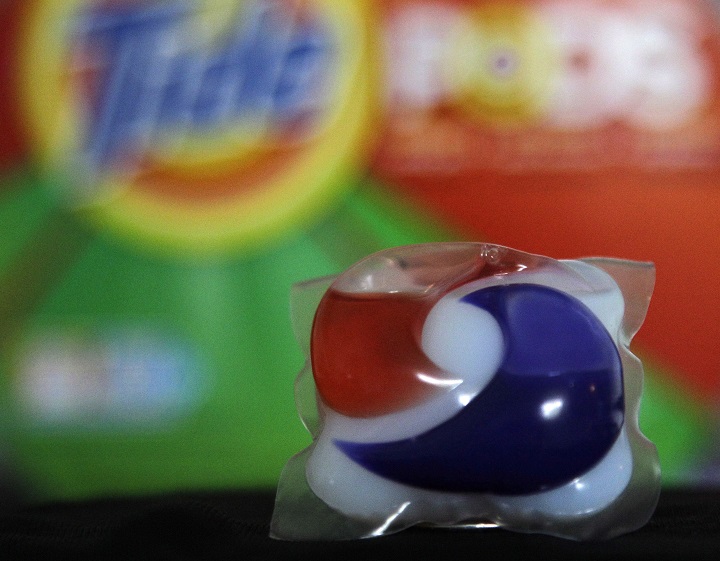Each day in the U.S., more than 30 kids are breaking into and consuming the colourful little packets of detergent pods parents use to do their laundry, a new report is warning.

They look like candy or toys, but the liquid laundry packets were the cause of more than 33,000 calls to poison control centres from 2012 to May 2015, according to Safe Kids Worldwide.
“Young children are explorers, and as they develop, often learn by touch and by putting things into their mouths,” Kate Carr, president and CEO of Safe Kids Worldwide, said.
“With the increasing popularity of liquid laundry packets, it’s especially important to make parents aware of the importance of keeping them out of the reach and hands of children,” Carr said.
READ MORE: Detergent pods poisoned more than 700 U.S. children in 2 years
The detergent pods are a concentrated, single-dose product designed to dissolve in water. When they come in contact with wet hands or mouths, they’ll dissolve too, releasing the soap and chemicals inside.
The kids’ advocacy group says the health risks are steep: children could faint, have difficulty breathing, excessive vomiting, severe eye burns and even temporary vision loss.
WATCH: A previous study showed that up to 17,000 calls were made to poison control centres in the U.S. in 2012 and 2013 for children under 6 who mistakenly swallowed laundry detergent pods.
But it says that preventing these incidents from happening in the first place is straightforward.
For starters, keep the detergent pods out of children’s reach and sight, keep them in their original container instead of lying around the household and if a child breaks into a pod, call for medical help immediately.
The findings suggest that 20 per cent of American households rely on the liquid packets to do their laundry. Between 2012 and 2013, more than 700 kids who were five and under dealt with “serious effects” from tampering with the detergent pods.
READ MORE: Health Canada monitoring child injuries from detergent pod poisonings
P&G, the makers of Tide detergent pods, said that safety is the company’s top priority.
“Most of us are parents too, and we want families to use our products safety,” it said in response to the report.
This isn’t the first study to sound alarm bells about detergent pods poisoning kids. Last year, another U.S. report warned that comas and seizures were among the most serious complications stemming from poisonings from these products.
- B.C. to ban drug use in all public places in major overhaul of decriminalization
- 3 women diagnosed with HIV after ‘vampire facials’ at unlicensed U.S. spa
- Solar eclipse eye damage: More than 160 cases reported in Ontario, Quebec
- ‘Super lice’ are becoming more resistant to chemical shampoos. What to use instead
In that study, 144 kids had eye injuries, 30 went into comas and 12 had seizures.
As of November 2014, Health Canada said that it received 138 incident reports tied to poisonings from the squishy laundry detergent pods (Health Canada did not respond to a request for updated numbers from Global News on Wednesday by the time of publication).
READ MORE: Parents call for change after product sample nearly kills toddler
Of those, 117 were international incidents, 13 were confirmed Canadian cases and eight were from unknown locations. Those 13 accidental poisonings didn’t result in death but the majority were considered serious cases.
“Health Canada is aware of this risk and is carefully monitoring these products. We have regularly communicated to Canadians about the risk that detergent packets can pose since they came into the market in 2012,” Health Canada spokesman Sean Upton told Global News.
“Parents are reminded of the importance of keeping them carefully stored out of sight and reach of children.
Right now, Health Canada is working with the U.S. Consumer Product Safety Commission and industry officials to develop safety standards, Upton said. It’s also collaborating with the Canadian Association of Poison Control Centres to track reports of accidental ingestions.
carmen.chai@globalnews.ca
Follow @Carmen_Chai





Comments